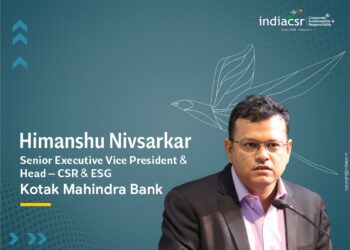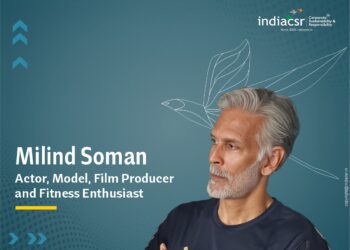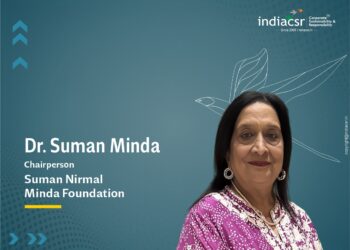Anders H. Lier, Chairman of Nordic Impact and Katapult, is one of the leading impact and exponential impact investors in Europe. With a long track record of working with and in India, we discussed impact investment, exponential technology and what the future may bring.
In an interview with India CSR Network; Anders H. Lier says, “Every day I get up in the morning and hope that today I will be able to help humankind thrive.”
From philanthrope to corporate social responsibility. Why is impact investment getting so much attention right now?
I have always worked in the corporate sector and given my evenings to charities close to my heart. I have been working close with Naandi Foundation since early 2000. Now that I am working in impact investment, I am able to bring the two together. Impact investment are investments made into companies, organizations or funds that provide a financial return and generate a positive and measurable social or environmental impact.
We hear more executives in the corporate sector move from discussing ESGs (Environmental, Social Governance) to evaluate corporate behavior and predict the future performance of the company to impact investments. I think this is still within certain circles. We will only really see a change and the impact that can be made when impact investment becomes mainstream. It should be the default way of making investments. The only way.
Why are you working in this space of exponential technology and impact investment?
Every day I get up in the morning and hope that today I will be able to help humankind thrive. I have had opportunities during my lifetime that also come with responsibilities. For me that is to use our knowledge, our caring and capital to contribute.
With technology we will be able to create an exponential shift from scarcity to abundance. And we need to use technology to change the great challenges our world faces because we are running out of time. Today there are less than 5,000 days until 2030 – the year we are supposed to reach the UN Sustainable Development Goals. We need to use exponential technology to work smarter and make a difference. Impact investment, like with exponential technology, has a catalytic effect. That is exactly what we need.
You spoke at Sankalp in Mumbai late last year. What are your key take aways from the Indian impact investment market?
The interest in India is becoming bigger every day. At Sankalp I met a lot of family offices, corporate executives and founders that want to enter impact investing. I am very impressed about Vinet Rai and his Aaavishkaar fund. They are paving the way with their vision to catalyze development in India’s underserved regions. People like Vinet and his team will identify capable entrepreneurs, provide them with capital, supplements it with a nurturing environment and helps build sustainable enterprises. That is impact investing in practice.
You have a few Indian startups in the Katapult Accelerator. How does the Accelerator work, why did you select these startups?
The Katapult Accelerator is the world’s first commercial impact and exponential technology accelerator set up to build the world we want to live in. It supports early-stage startups that use exponential technologies, for example artificial intelligence, blockchain, virtual reality, and augmented reality, to solve a social or environmental challenge.
The 12 startups in the first batch presented to 300 impact investors from around the world at the demo-day. For our second round we had access to 1,500 startups, and one Indian startup joined the accelerator. Oizom is an impact tech start-up focusing on CleanTech IoT. They are working to address the global problem of pollution and climate-change by using technology.
They are redefining fundamental natural resources like air, water, and soil through systematic data acquisition and analytics. The platform enables data-driven decisions by actionable insights. The partners from Turkey, South Korea, Morocco and India developed a dense data-grid of networked instruments to collect data of air pollution to accurately forecast air pollution. We are really excited and proud to have them on board.
Batch three starts August, 2018 and applications are open now. The startups selected will receive a USD 150,000 investment, have access to 120+ international mentors, and hands-on support from the Katapult Accelerator team. At the end of the three months, the startups will have defined their vision, strategy, impact orientation, growth marketing and business model to help them prepare for the next round of evaluation.
What trends are you seeing in the Nordics? What can India learn from this?
According to the latest analysis of the social impact investment market in the Nordics, there has been a 200% year on year growth in Nordic social impact investments. On average 8.3% of the total tech investments in the Nordics have roots in social impact, and 15.15% of the total Norwegian tech investments are social impact, which is the highest percentage in the Nordics. And this comes from a country that has been dependent on oil…
There are startups on every street corner in India. By coming together in start up hubs, investing in these communities and continuing to build on the indepth technology expertise that you have today in cities like Bangalore, but also across the country, means that India quickly can become a frontrunner in terms of solving the grand challenges the world faces while receiving a financial return.
What do you think the future will look like?
I’d like to go back to one of the first questions. Impact investment is being discussed in communities around the whole world so in the near-future (May 14-16) we are expecting around 600 impact investors, startups and industry experts to participate in the Katapult Future Fest in Oslo. Over three days of conversations, experiences and connections we hope to learn how exponential technologies and impact investment can be used to create a thriving future.
By coming together in person and working together I believe we will see impact investment becoming mainstream in the next five years or so. Once people see that when you invest in society and the environment you earn money, then the barrier to begin to impact invest will become even lower.
Disclaimer: The views expressed by the interviewee in this feature are entirely his own and does not necessarily reflect the views of India CSR Network and its Editor.
Terms & Conditions: India CSR Network does not permit other Websites/Agency to copy or reproduce or reprint the above article/feature in any form or means.






















